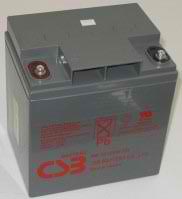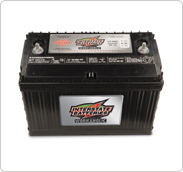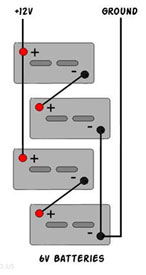RV Batteries are Critical for a Happy RV'er!
RV Batteries have kept pace with the needs of the power hungry RV'er!
Years ago, technology just wasn't there for the RV Battery or the RV'er for that matter!
We didn't have cell phones , computers, dish TV's, etc. to create a big need for power supply. The average RV'er was happy to have the smells and sounds of the outside world.
Today, we have to have our computers, cell phones, TV's etc. always powered up or certainly ready to be powered.
Fortunately, coach batteries have kept up with the demands of the consumers.
There are two different types of Batteries needed for the average self contained RV - Chassis Battery and Coach Batteries. Depending on the coach size and needs of the engine and occupants will determine sizes, etc.
Both chassis and coach batteries are extremely important!
Coach RV Batteries

The Coach Battery (House) system will supply DC Volts to the basic elements within the RV - the propane furnace, the hot water heater, safety monitors, interior lights, the refrigerator, etc., etc.
That same battery system will also provide the 12 volt DC that gets changed, thru the Inverter/Converter to 120 Volts AC for the bigger items on your list - the regular outlets within the RV that you use for that coffee maker, the toaster, the desktop computer, the laptop and of course, the TV and dish system as well!
The coach batteries will not be able to power your Roof AC
units or Washer/Dryer - those are high amperage draw appliances that
would literally suck all the energy from those batteries too quickly!
Most RV's that have higher energy needs will have 4 of these deep cycle
batteries wired together - however, they will be a 6 volt battery,
instead of 12 volt capacity.
The 6 volt battery designs have a higher amperage rating and allow for lots of energy usage. These are also a deep cycle battery.
Chassis RV Battery

The Chassis Battery is what starts the RV engine.
The chassis battery and the coach battery are 2 separate battery systems - except they both will get charged by a common method.
All chassis battery systems are based on a single 12 volt battery - that will allow high amperage draw (especially if a diesel). The starter of a diesel will draw considerable power from that battery to start the engine - but that's all it really has to do.
It is usually not a deep cycle type battery.
As a safety on many RV vehicles, there is a switch on the dash that will allow the RV'er to combine the chassis and coach battery power while tying to start the engine or the generator.
This should be done only in an emergency - and carefully!
If the generator and/or engine won't start - don't drain both batteries - then you really will need a tow truck, no matter where you're parked!
Types of Batteries
Lead Acid is the traditional battery that has been around for decades. They've been starting your cars for years.
Unfortunately, they require maintenance and give off stinky, dangerous sulfur fumes.
Maintenance Free Batteries are also pretty old technology. They started with GM Batteries and branched out from there. Not always dependable - better now.
They are still a lead acid type of battery. Usually the top is sealed so it doesn't need fluids.
AGM - Absorption Glass Mat batteries are quickly taking over the "coach" side of RV batteries - with good reason!
AGM Batteries are completely sealed, deep cycle, do not have any fumes and can be mounted in any position needed! Pretty Cool, huh?!
Their design also makes them last longer - the plates inside can be separated so they don't break or short-out like the old "lead acid" type!

From a safety standpoint alone - AGM's are the ticket!
They
will not emit any dangerous fumes into the RV. Now, granted the coach
batteries are mounted under the RV - but all you need is some rusty hole
and be boondocking a lot! Fumes will come inside! However, technology is always improving; so, research before getting your new batteries
Charging Your Batteries

Charging your RV Batteries is quite a feat on today's RV. Depending on what you have as options on your vehicle while determine how your batteries are replenished!
1. Start your engine and let the alternator charge them.
2. Start your generator for additional power and it will charge your batteries at the same time.
3. Plug into your favorite RV Park or Campground (Shore Power)
4. Passively with solar panels mounted and angled on your roof!
5. Windmill - similar to solar - passive energy replenishment.
Battery Maintenance
Depending on your type of battery(s), you may not need to do too much.
However, the battery cables for both the chassis and coach batteries must be cleaned.
A good steel wire brush and top post battery cleaner are really all that's needed. Turn off all your battery Main Switches, disconnect from shore power, have your generator off and go to it. Take each cable end off from it's battery and give it a good cleaning with the wire brush.
Within 20 - 30 minutes your done and it sure beats a bad connection "no crank" on a cold or rainy day!!
Unless it is an AGM or "Maintenance Free" Battery, the water level must be checked.
That should be checked at least every 6 months? Perhaps sooner?
Distilled Water
is the only liquid to add to your lead acid battery! The plates down inside the little openings must be covered at all times with water.
Batteries Installed Correctly - in "Balance"?

This drawing shows a "typical" configuration of RV batteries - if you're lucky! It's pretty close to OK, but a slight improvement will do wonders for your battery life.
Gary Bunzer, a/k/a - The RV Doctor - wrote an excellent article for FMCA in it's January 2012 magazine. It's called "The Balance of Power"
As usual, Gary is spot on with his information.
He explains how the 4 "6-volt" batteries should really be hooked up. Providing a "Balance" to your batteries keeps them healthy for years!
Please go to The RV Doctor's article here:
The Balance of Power - Sorry, No longer available in FMCA!!
You'll quickly learn the common sense approach to saving your RV
batteries and also realize yours may be installed "not quite correctly" -
that last 10% is so tough to get these days - possibly, even from the
"factory"!!